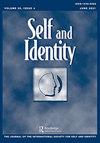Knowing who I am depends on who I’ve become: Linking self-concept clarity and temporal self-comparison
IF 2.1
4区 心理学
Q3 PSYCHOLOGY, SOCIAL
引用次数: 1
Abstract
ABSTRACT The current research examined how temporal self-comparisons influence self-concept clarity. In Studies 1 and 2, we updated and validated self-report and indirect measures of state self-concept clarity, including specific components identified in prior research. In both studies, participants’ confidence in their self-judgments, as well as the consistency of those judgments, were associated with the self-reported state self-concept clarity. Using the updated measures, Study 3 found that self-concept clarity was highest when participants engaged in temporal comparisons that focused on positive similarities between their past and present selves and when comparisons highlighted improvement over time. These findings suggest that self-concept clarity is an emergent phenomenon that arises from comparison-based self-evaluations that fit common lay theories about how the self develops over time.知道我是谁取决于我成为了谁:将自我概念清晰和时间自我比较联系起来
当前的研究考察了时间自我比较对自我概念清晰度的影响。在研究1和2中,我们更新并验证了自我报告和状态自我概念清晰度的间接测量,包括先前研究中确定的特定成分。在这两项研究中,参与者对自我判断的信心,以及这些判断的一致性,都与自我报告状态的自我概念清晰度有关。使用更新的测量方法,研究3发现,当参与者进行时间比较时,自我概念的清晰度最高,这种比较侧重于他们过去和现在的自我之间的积极相似之处,当比较强调随着时间的推移而改善时。这些发现表明,自我概念清晰是一种新兴现象,源于基于比较的自我评估,这种评估符合关于自我如何随着时间发展的一般理论。
本文章由计算机程序翻译,如有差异,请以英文原文为准。
求助全文
约1分钟内获得全文
求助全文
来源期刊

Self and Identity
PSYCHOLOGY, SOCIAL-
CiteScore
5.10
自引率
5.00%
发文量
26
期刊介绍:
Work on self and identity has a special place in the study of human nature, as self-concerns are arguably at the center of individuals" striving for well-being and for making sense of one"s life. Life goals develop and are influenced by one"s view of what one is like, the way one would ideally like to be (or would like to avoid being), as well as one"s perceptions of what is feasible. Furthermore, conceptions of self and the world affect how one"s progress towards these goals is monitored, evaluated, redirected, re-evaluated, and pursued again. Thus, the “self” as a construct has far-reaching implications for behavior, self-esteem, motivation, experience of emotions and the world more broadly, and hence for interpersonal relationships, society, and culture.
 求助内容:
求助内容: 应助结果提醒方式:
应助结果提醒方式:


